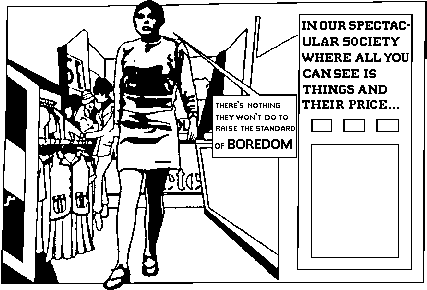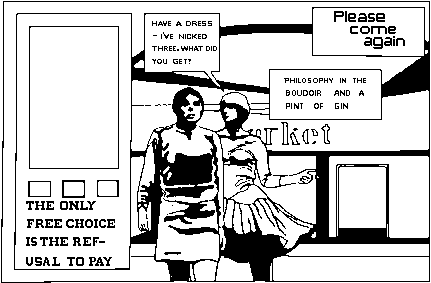|
 Debord's
"Spectacle" as the concept that condenses the insights
of Marx on commodity fetishism and the Frankfurt school on the culture
industry Debord's
"Spectacle" as the concept that condenses the insights
of Marx on commodity fetishism and the Frankfurt school on the culture
industry
Guy Debord's The
Society of the Spectacle (1967) develops a theory of the spetacle
out of the Marxist concept of commodity fetishism and Horkheimer
and Adorno's analysis of the culture industry.
Web resources are particularly rich for study of Guy Debord and
the leftist group he formed, the Situationalists International.
The argument:
If the fetishims of the commodity abstract social relation of human
work into a spontaneous relation between things, and the culture
industry extends control by Capital over leisure, then advanced
capitalism (after the triumph of television) brings about a new
level of abstraction:
- now, according to
Debord, the ultimate commodity is the Spectacle---those images,
fictions, and discourses of information, propaganda, advertising
and entertgainment which promote the commodity's purchase.
- By Debord's account,
new technologies of representation have so increased the quantity,
scope, and force of spectacle, that the spectacle changes quality:
· saturating the world it become the informing media of cultural
formation.
- The spectacle appears
self-sufficient and complete
- It overcomes all reserves
of spectator skepticism by borrowing from itself (e.g. Lucas's
Star Wars to the "Star Wars" of Reagan and Bush)
- By drawing upon a
traditional Western connection between knowing and seeing, this
spectacle claims to represent all, truly and totally. [CBS logo;
Cronkite's "That's the way it is."
- Although the spectacle
is relentlessly affirmative and unifying, because spectators are
kept remote from the origin of the spectacle, and because communication
is unilateral, dialogue impossible, and criticism difficult to
make consequential,
- …modern spectacle
perfects the separation of the spectacle that encloses and engulfs
its spectators.
Debord's bleak
1988 retropect on The society of the spectacle.
|
|
Interrupting the Spectacle
In imitation of Adre
Breton's leadership of an early art and theory movement (Surrealism),
Guy Debord starts a group called "the Situationist International."
The group develops several social-aesthetic practices for interrupting
the cultural systems of advanced capitalism:
- the "derive":
(literally, to 'derive'; "A trip with no destination, diverted
arbitrarily en route. ") By taking random tour from unknown
subway stations, the Situationists sought to inhabit geography
in ways unimagined by their designers and planners. Another example
of this sort of tactical subvertion of original purposes: using
public sites for graffiti art and propaganda. )
- the "detournment":
(literally 'detouring'; we would say "repurposing" parts of the
spectacle to expose its internal logic). Debord made films by
splicing together : in both cases, what the Situationists do is
a) acknowledge the enormous strategic superiority of the system,
but b) then venture a tactical intervention ("on the ground of
the other"). This way of responding to the idea of the totalizing
power of the Spectacle can be followed through DeCerteau's critique
of Foucault, and the former's development of what he calls "the
practice of everyday life."
- the art of the
aphorism: If the preferred technique of the society of the
spectacle is engulfment--total immersion of the spectator in a
spectacle which is hurled at the eye and ear at a speed as fast
as thought, cutting and morphing, at once absorptive and distracting,
a tide of alluring candy for the eye and ear, and projected before
us by a media apparatus others control--then, how does one slow
down this media machine, and create the space for genuine critique?
Debord's answer in The Society of the Spectacle is the
aphorism. Most probably indebted to Nietzsche, Debord's aphorism
offer short, abrupt, disconnected statements about the spectacle
within advanced capitalism. Suggestive and difficult, they require
a reader who is patient, active, and in dialogue with the text;
harsh in tone and sweeping in their scope, each of these aphorisms
seems designed to provoke and challenge the reader.
|
|

